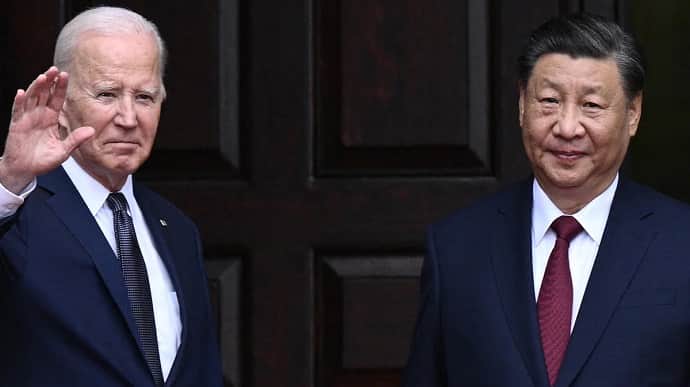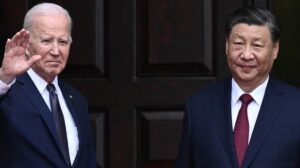Chinese tricks. View from Ukraine
On November 15, 2023, a meeting between US President Joe Biden and Chinese leader Xi Jinping took place in San Francisco. In Ukraine, the negotiations of the two leaders, which took place during a dramatic period, were especially closely watched: while the president and his guest enjoyed a conversation, an exquisite lunch and a walk through a picturesque park near the famous Filoli house, the second «temporary budget» voted in Congress this year.
Why does Kyiv need Taiwan?
This vote directly affected the state budget of Ukraine. At the same time, the meeting of the leaders of the United States and China gave an answer to the important question for official Kyiv, to what extent American military assistance will be continued in 2024.
Kyiv received the answer to the first question quickly: Congress voted on a «temporary budget» without allocating financial assistance to Ukraine, Israel and Taiwan. In conversations with reporters, congressmen, both Republicans and Democrats, said the same thing: they understand how important it is to support Ukraine, but America’s needs come first for them.
The answer to the second question became clear later, by the middle of the day on November 16, when the details of the negotiations between Biden and Xi became known.
We won’t give up, but we’ll ask
The day before, US Security Council strategic communications specialist John Kirby argued that the Ukrainian issue would be one of the key issues within the framework of the negotiations. By November 16, it became clear that this was said, perhaps, in order to reassure official Kyiv. Judging by the text of official releases, Joe Biden and Xi Jinping discussed the situation in Ukraine among other conflicts (Israel, Taiwan). But if on Taiwan they reached an agreement to keep in touch and not resort to extreme measures without talking to each other, then on Ukraine, as the spokeswoman for the Chinese Foreign Ministry said, the position of official Beijing remained unchanged.
I believe that Kiev also understood this, but Vladimir Zelensky had no time to decipher Chinese puzzles. He received British Foreign Secretary David Cameron and CIA chief William Burns. David Cameron’s visit was symbolic: the formal occasion was the transfer of humanitarian aid, but Boris Johnson’s great friend, figuratively speaking, picked up the banner that he dropped. As for William Burns, he stopped in Kyiv in transit on his way to Israel, where he had not reached at the time of writing.
This increased movement of high-ranking officials of key powers indirectly indicates some important foreign policy changes.
Some Western experts believe that the Kyiv guests discussed options for “freezing” the war in Ukraine. In any case, against the backdrop of the White House’s open statement about the insufficient funds to help Ukraine in the same volume as before, this is the only logical option.
Hot winter
But Vladimir Zelensky once again officially stated that there can be no talk of any “freezing” of the conflict.
However, the fact that this year the Ukrainian armed forces are unlikely to be able to reach the 1991 borders is becoming increasingly obvious.
A source familiar with the situation told ZamPolit that the situation is actually very precarious. On the one hand, the military is without rotation, fatigue has accumulated, multiplied by limited ammunition supplies. On the other hand, the realization that both the winter truce and the diplomatic end of the war with the fixation of the status of the territories “de facto” will be a disaster. The only option left is to hold the line and hope for political changes in Russia or a new wave of military support from Western partners. This is probably what Vladimir Zelensky has in mind when he talks about the impossibility of “freezing.”
True, this option is real under one important condition — if the aggressor country does not launch a winter offensive. In the context of this scenario, China’s unchanged position becomes the best outcome for Ukraine, since Beijing is now officially neutral. For an offensive by the Russian Federation in winter, it would require a lot of ammunition, including UAVs. This means supplies from Iran, but Iran may be distracted by a war in Israel. But there is China, which has an economic recession, but has resources and, most importantly, production capacity.
The best of the worst
Therefore, China’s unchanged position is the best of the worst. Beijing’s conditional neutrality on the Ukrainian issue is now, as they say, included in the outline of the “Vision of San Francisco”. Simply put, China will not be able to openly and in large quantities supply ammunition components and ammunition itself to the Russian Federation without fear for good relations with the United States. And official Beijing is very proud of its good relations. The flow of laudatory articles about the United States, the important role of American culture in Chinese culture, and the significance of Xi Jinping’s visit to San Francisco surprised even the Chinese with party cards. After all, America was introduced earlier. at best, like an enemy who must be tolerated.
Therefore, Kyiv can be calm on this side. But this does not mean that the two leaders agreed on peace. Rather, on the contrary, probability. a new source of conflict is growing.
Where will it explode?
While the United States and China at least tried to discuss the accumulated contradictions, the United States and Russia are not even making such attempts. Moreover, increased US contacts with Kazakhstan and Armenia are viewed unkindly. The failure to sign a peace treaty between Armenia and Azerbaijan is a bad signal. Just like Finland’s push to not allow Russians on bicycles through.
These details, sometimes comical, are fraught with menace. Nagorno-Karabakh is a long-term problem that not two general secretaries of the USSR times, nor two presidents (of the Soviet Union and the Russian Federation) could solve. Vladimir Putin tried to do this. But if the conflict there again escalates and spreads to the Caucasus, the current Russian president will face considerable difficulties. like the United States, Russia will not be able to survive two wars at once. In another case, Finland, which at one time could not be defeated by the powerful army of the Soviet Union, could become the epicenter of escalation. One can only guess how this will affect the elections in the Russian Federation.
Transit meeting
Perhaps the weakening of Russia in 2024 was one of the main goals of the American side, which so diligently lured the Chinese leader to sunny San Francisco. After all, this meeting is an intermediate one.
In any case, this is what Ukrainian political scientist, candidate of political sciences and executive director of the International Association of Small Communities Aleksey Buryachenko thinks.
In a comment to ZamPolit, he assessed the meeting of the two leaders:
“I think it was not in vain that the APEC summit field was chosen. since this format did not provide for bilateral agreements. Given the tense issue of Taiwan, especially after Nancy Palossi’s visit there, an interim meeting was needed at which the parties would “agree to negotiate.” And that’s what happened. However, it is noticeable that the Chinese side was offended by the statement about Xi as a “dictator.” Joe Biden awkwardly tried to soften his position, but only confirmed his opinion about the Chinese leader, expressed earlier. However, this reservation only emphasizes the desire of the American side, in the name of global security, to negotiate even with those whom it considers “dictators” on key issues.”
“Even with the devil!”
This is an important point. Perhaps a new foreign policy trend will be set, because now it is almost impossible to meet with “dictators”; this is considered bad form in international politics. We observed the isolation of Vladimir Putin, Alexander Lukashenko and how this isolation works, how strong it is. Security concerns may now come to the fore. You can recall the expression of our president, “I’m ready to negotiate even with the devil.” Joe Biden was the first to make such an attempt.
And what happened? “The two leaders spoke, first of all, about bilateral geopolitical interests, but economic ones were not forgotten,” emphasized Alexey Buryachenko. “After all, these were the fields of the summit of regional economic cooperation. Given the slowdown in Chinese economic growth, particularly the outflow of investment, if the US and EU decided to withdraw corporate investment, China would be on the verge of default. Therefore, it was very important to show both the internal electorate, because Xi needs support in any case, and external players that he does not want to break off relations with the United States, that there are no risks in economic terms. And this is important. It is not for nothing that after the meeting with Biden, a meeting was held with representatives of American big business, where Xi guaranteed the safety of their investments in China. In my opinion, this is a marker that shows the real result of the meeting on Jinping’s part. . Xi also needed to show the whole world that he was on the same level as the United States. China is a very delicate diplomatic game in which it is willing to wait and act tactically, solving its problems while maintaining its strategic geopolitical interests. Against the backdrop of the election race, the United States had to show that it was capable of establishing constructive relations with China and controlling it in such important actions that could lead to even greater global destabilization. For example, in support of Iran or the Russian Federation. And first of all, of course, in resolving the issue with Taiwan by force. In principle, given that China made it clear that it did not intend to do this in the short term, the parties found a compromise. It is important that they agreed on a direct telephone line not only among themselves, but also between the military for quick communication. This will allow us to jointly find the best solutions in “hot” situations. Moreover, next year is of such important political importance for the United States and Washington certainly does not need additional points of destabilization.”
Stabilization impulse and Ukraine
Alexey Buryachenko believes that this meeting can provide a global stabilization impetus. “Perhaps it will not be long-term,” the expert emphasizes, “but that’s it. that at least there are no formal disagreements and the parties are ready to communicate, it will work positively. I think there will be further meetings, because decisions are required by the architecture of global security, the reboot of the UN Security Council and the reduction of the nuclear arsenal, which the Chinese have significantly increased over the past year.”
But how can we talk about global security architecture without Ukraine? In fact, no one expected a miracle that at this meeting the armed aggression of the Russian Federation in Ukraine would be stopped, but it was on the agenda of the negotiations, Aleksey Buryachenko noted. “Therefore, it is impossible to say that it was ignored or not discussed,” the political scientist emphasized. — They talked about Ukraine more through the prism of containing the Russian Federation, and discussed the volume of Chinese assistance to Russia. But here we must understand that not the entire meeting was public. And what the parties considered necessary to say publicly was that they said about containing the Russian Federation. I think that in the non-public part the issue of the war in Ukraine also took place, because it is a very serious destabilizing factor. which has long gone beyond the regional conflict. Moreover, it also affects China itself. So I think these three topics are: Taiwan. The Middle East and Ukraine were at the same level of importance for the parties to the negotiation process.”
ZamPolit



